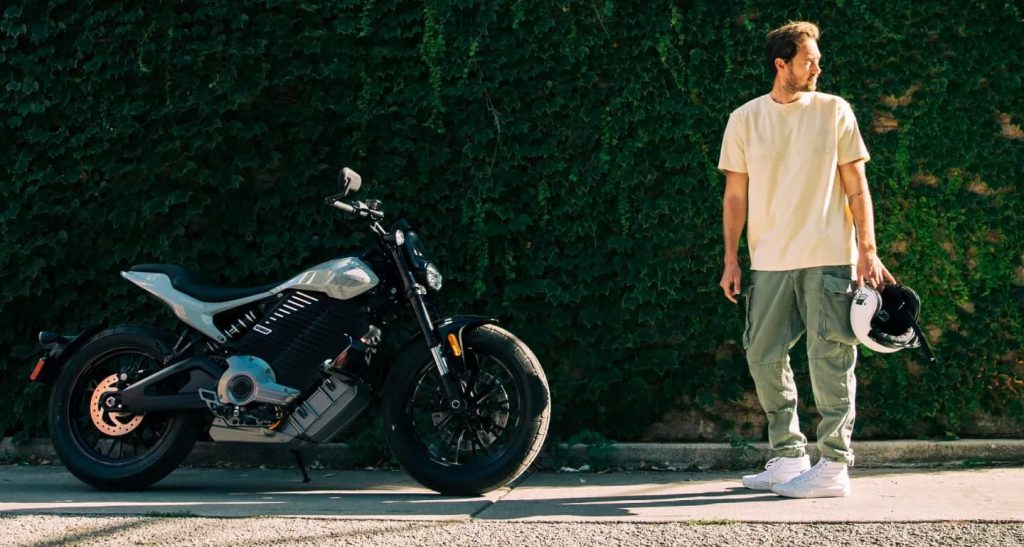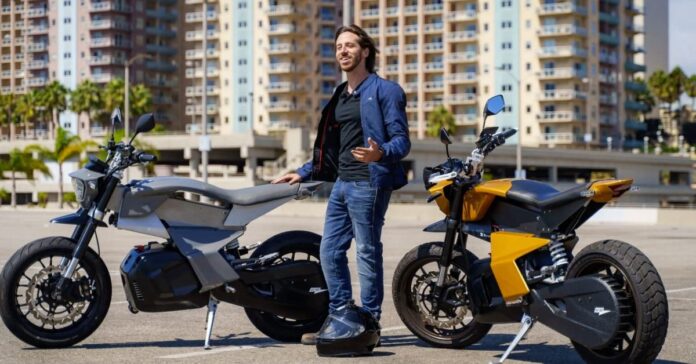The world of motorcycles is rapidly changing, with the rise of electric motorcycles heralding a new era of motorcycling. If you’re considering getting your first motorcycle, there’s never been a better time to join the electric revolution. Electric motorcycles are the perfect first ride for anyone entering the world of two wheels, offering numerous advantages over traditional combustion engine-powered bikes. From better control to reduced maintenance and even lower operating cost, electric motorcycles are the perfect starter bike.
This is going to be controversial for traditional riders who grew up on gassers. That’s fine. This article isn’t for them. It’s for you, a prospective rider who sees the advantages of getting around on two wheels (fun, convenience, cost, lifestyle, parking, etc.) and is trying to decide if it’s time to join up and on what type of bike.
Many folks who have been riding for years or decades will tell you that you have to learn on a gas bike. Why? Because that’s how they learned.
What a terrible reason to do something, “because that’s the way it used to be done.” We’re living in the future, congratulations! Doctors no longer prescribe arsenic to treat headaches and you no longer have to ride on a loud, leaking, and vibrating combustion chamber. You’ve got options now, and one of those options is the choice to leapfrog century-old technology and go electric right from the start.
As a relatively young rider (34, to be exact), I’ve come of age in my motorcycling journey during a time when both electric and combustion-engine bikes were readily available. And so I fortunately had the chance to compare both without being forced to fall in love with only one because it was my single option at the time like most older riders.
And that has taught me that combustion engine bikes have essentially two and only two advantages over electric motorcycles: It’s fun to run through the gears, and they can be ridden on cross-country trips for more than a couple hours without needing to stop for a charge. That’s about it.
Everything else comes up heads for electric motorcycles, especially when you’re talking about a new rider getting their first bike.
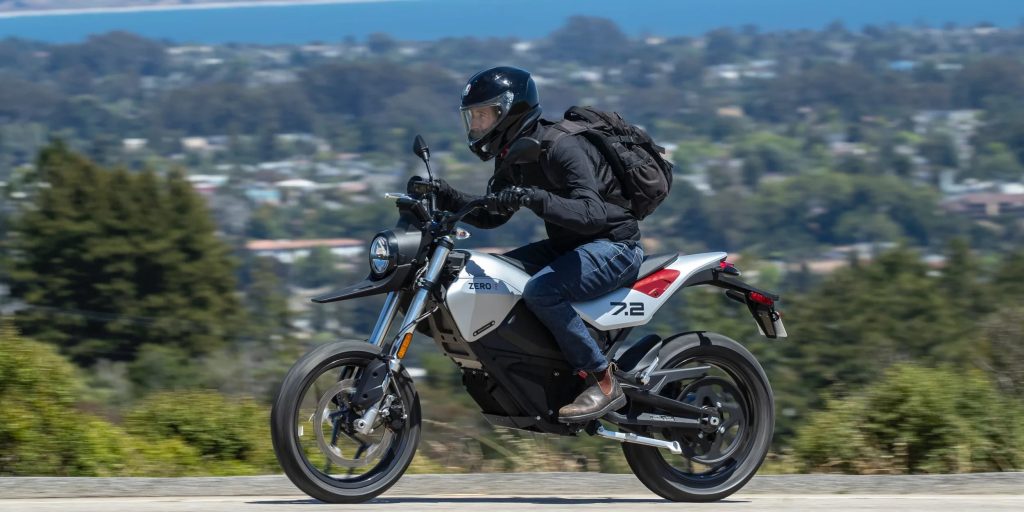
Ease of control
Electric motorcycles are generally (but not always) single-speed, meaning you have no gears to shift. They aren’t automatic transmission since there isn’t any shifting, but it’s fairly analogous to comparing a car with a manual transmission to one with an automatic transmission.
Sure, it’s fun shifting. I learned to drive on a car three times my age with a stick throw so long I had to lean forward to hit first and third gear. But it was also much more to learn, complicating the process.
The same goes for learning to ride a motorcycle. If you’re new to manual transmissions, you have to learn not only how to control a motorcycle’s movement, but also how to shift gears. Those are two very different but equally important concepts and motions. Having gone through both learning processes, I can tell you that it’s just much easier to learn to ride on an electric. Without worrying about any shifting, 100% of your focus is on your riding. That means more mental energy for bike control, car awareness, road debris, lane presence, etc. Those things will eventually be second nature to the point that you don’t even think about them, but when learning to ride it is much easier to learn those things without also having to think, “Wait, that car just pulled out in front of me, did I slow enough for second gear or should I be in third before I let this clutch back out?”
The downside of the single-speed setup on e-motorcycles is that you don’t get the fun feeling of running through the gears. I do miss it sometimes, and it’s pretty much the only part of riding gas bikes that I enjoy more than electrics. But since the tradeoff is that you can repeatedly unleash the crazy performance of electric motorcycles like Harley-Davidson’s LiveWire One with its 3 second 0-60 mph time — all without needing to shift — usually makes up for it. The other saving grace here is for commuters. When you’re riding in traffic or otherwise commuting through a city with lots of starts and stops, shifting turns from something fun into an annoying chore.
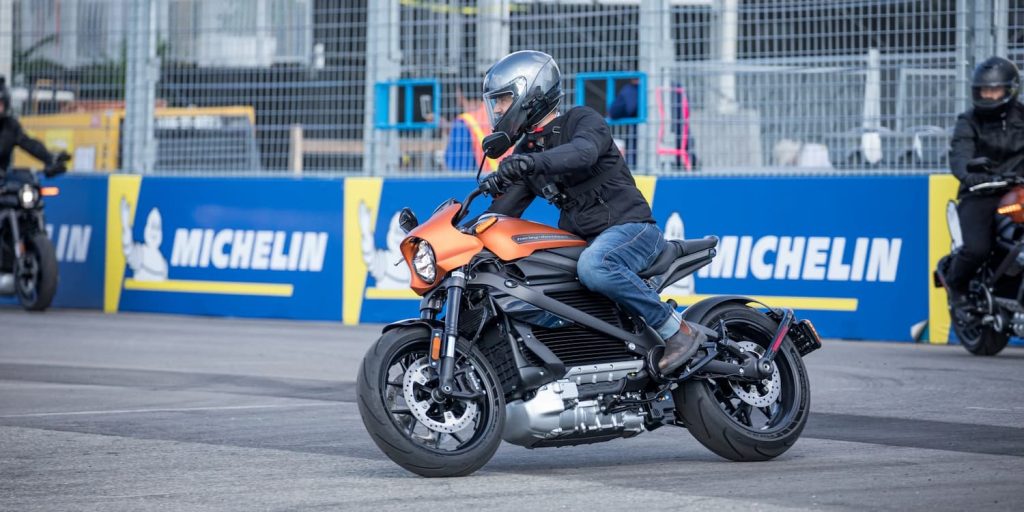
Speaking of ease of control, a light electric motorcycle makes a great upgrade from a powerful electric bicycle since the controls are so similar. I got started with motorcycling this very way. In 2010 I found my way into high power DIY electric bicycles – essentially e-bikes that exceeded the legal limits of traditional electric bicycles. At a certain point you want to go even faster with even more power, only to realize that you’re basically building a motorcycle on a bicycle frame.
That’s where a lot of people make the decision to just jump into real motorcycles and enjoy the added benefits of higher quality and safer components, not to mention finally being street legal again.
Many electric motorcycles forego the traditional foot lever rear brake for a hand lever instead, more closely mimicking bicycle controls. A quick note though: If you’re not in an already backwards country like the UK, you’ll find motorcycle brakes and bicycle brakes are reversed from each other, i.e., the right brake lever controls the front brake on a motorcycle. As someone who goes back and between e-bikes and e-motorcycles, often in the same day, it’s a little mental note that is important to master.
Having two hand brake levers makes an electric motorcycle even easier to control, especially for new riders that are already familiar with bicycles. Traditional motorcyclists that are used to a foot brake will usually say they prefer it, but that’s because it’s what they’re used to. Again, we have better options now because we live in the future. Hand controls are more precise. Throw a basketball at the hoop and even the least athletic among us will probably at least hit the backboard. Now try again with your foot and see how close you get. Hand control is simply more intuitive and easier.
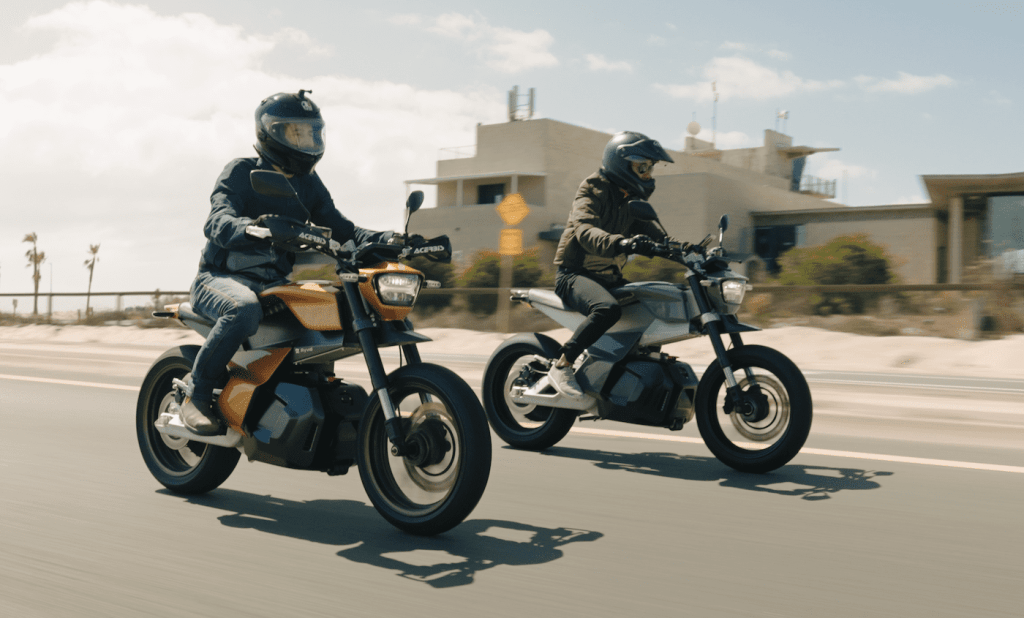
Electric motorcycles require less maintenance
This is probably the biggest single advantage of electrics over gas bikes. And I have a lot of personal experience with it. Electric motorcycles aren’t maintenance free, but they’re pretty darn close. You’ve still got tires and brakes to keep an eye on (and a chain if you don’t have a belt drive bike), but those are few and far between issues. Gas bikes require much more frequent maintenance to keep them running well since their engines are a collection of hundreds of moving parts instead of an electric motor’s single spinning shaft.
My sister rides a 250cc bike. I ride electrics. Guess who’s bike is constantly needing work here and there to keep it running well?
If your goal with getting into motorcycling is to actually ride, then electric is probably for you. If you’d rather spend a good bit of your time wrenching instead of riding, then perhaps an engine based on 100+ year-old technology is right for you.
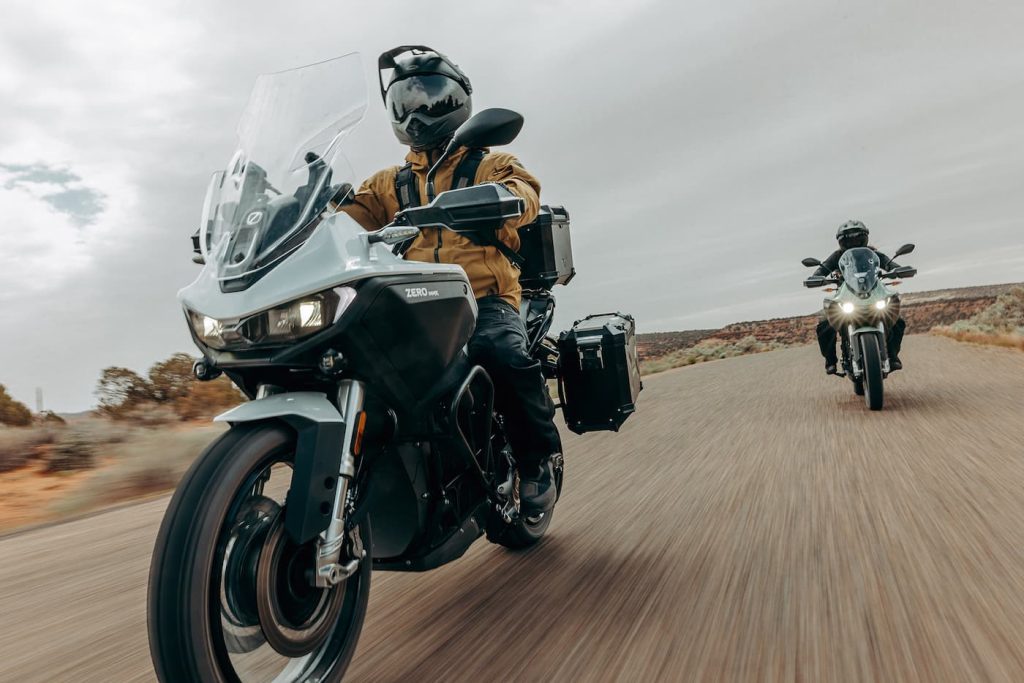
Electric motorcycles are cheaper to operate
When it comes to daily operating costs, there’s no comparison. Electric is simply easier on your wallet.
And it’s not just the fuel. Sure, gas is expensive compared to much cheaper electricity. That’s an easy one to see the instant advantage of electric drive. But it’s all the other costs that add up too.
There are no air filters to replace. There are no periodic oil changes. There’s not a constant list of consumables that you have to keep buying in order to ride.
And depending where you live, electric motorcycles come with other benefits. I pay significantly lower monthly insurance rates because my bike is electric. Where I live, a 1,000cc-equivalent electric motorcycle has an insurance rate of a 250cc motorcycle. Many countries also offer incentives like reduced toll fares or cheaper parking permits, though you can often get away with parking motorcycles for free when they fit into smaller areas that cars can’t park.
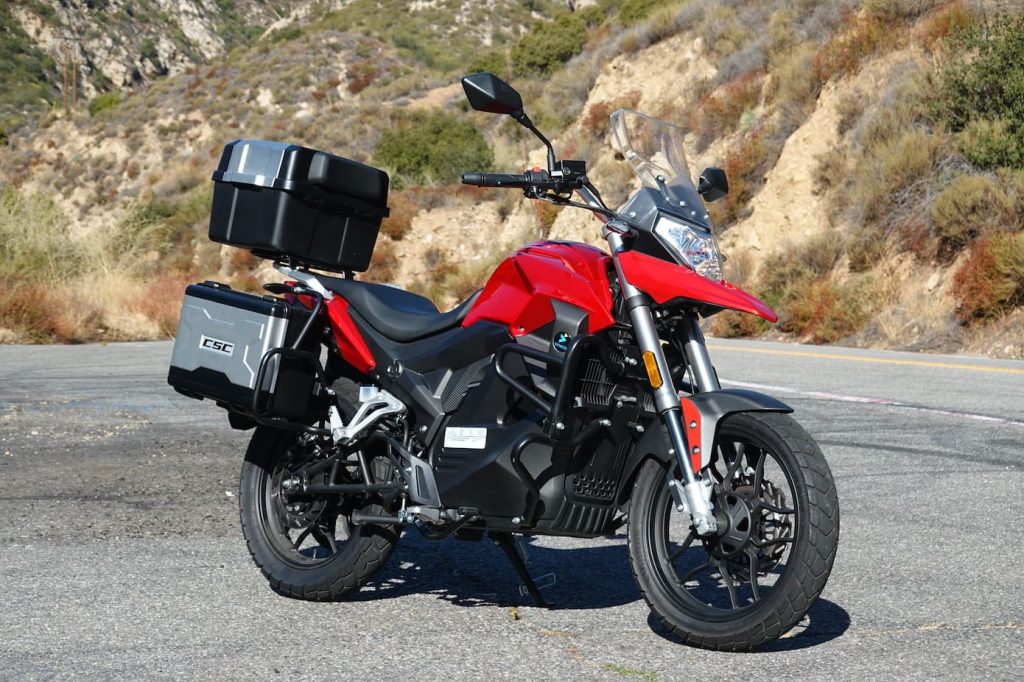
Electric motorcycles are quieter, smoother, and more comfortable to ride
Electric motorcycles offer a better ride experience because they are quieter, smoother, and more comfortable. That’s actually three benefits in one, so let’s break it down.
Electric motorcycles are quieter than combustion engine motorcycles, and this is a big advantage. You can hear things happening around you, whether that’s animals in the forest, approaching car danger, or the musings of your riding partners. Being able to carry on a conversation while riding next to a friend or with others at a stop light is a nice bonus. You can roll out in the morning without rumbling exhaust annoying your neighbors or waking the baby. A few years ago I was in LA and went on an early Sunday morning sunrise cruise through a super fancy Hollywood neighborhood on a Harley-Davidson LiveWire. I enjoyed winding through the hilly residential streets on one of Harley’s burliest and quickest motorcycles (0-60 mph in three seconds flat!) yet without waking the occupants of all the fancy houses I was drooling over. The few people awake and out on morning walks gave me a smile and wave and instead of dirty looks for riding a loud motorcycle through their neighborhoods early in the morning.
And don’t for a second buy that silly “loud pipes save lives” misconception. There are few larger fallacies in the world of motorcycles. We’ve all been in a car before, either parked or moving, only to be startled when a loud motorcycle whizzes by the door. It’s startling because we didn’t realize it was coming. Which is the whole point, and illustrates that loud pipes do nothing other than annoy people parked next to you at a red light. Cars are so sound-proof these days that even a loud motorcycle is on top of them before a driver even realizes it. You’re buying yourself a fraction of a second early warning at most, and in some cases that can be even more dangerous when a loud bike spooks a driver into doing something stupid.
And gas bike riders who are relying on their exhaust noise alerting drivers are actually at a disadvantage. Too many drivers with headphones or talking on their phones will be completely oblivious to loud motorcycles. Relying on them hearing you is a good way to get yourself hurt or killed.
As an electric motorcycle rider, I don’t wonder if drivers see or hear me. I just assume they don’t. That allows me to always ride as if I am invisible to drivers and to make defensive riding decisions accordingly. “Loud pipes” are a dangerous crutch. They don’t save lives, aware riding does.
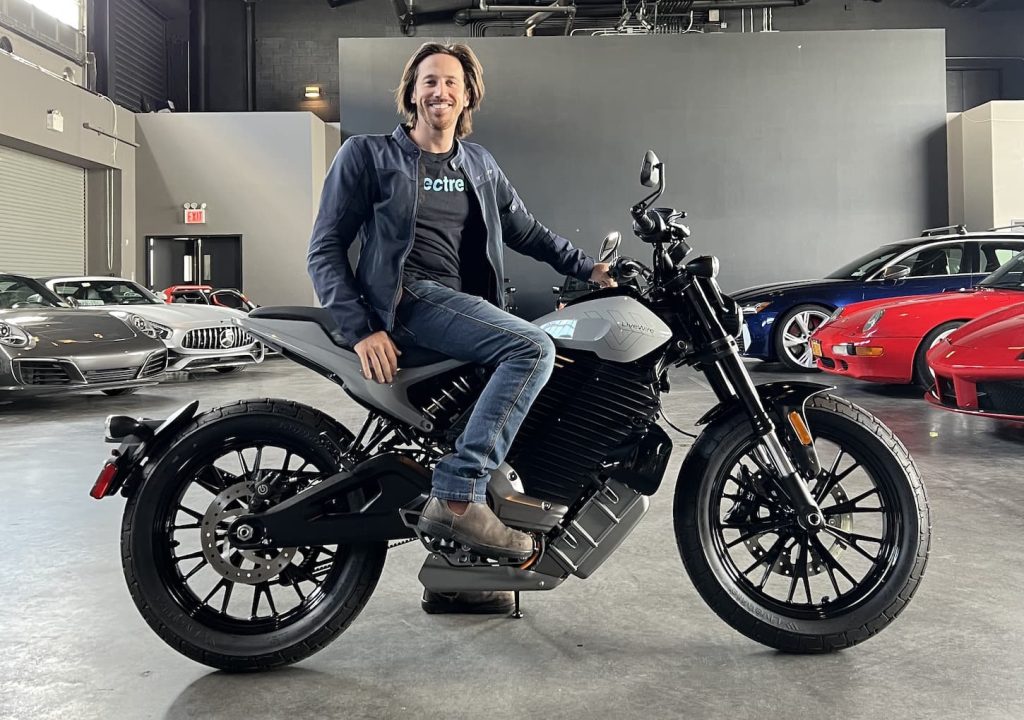
Next, electric motorcycles are smoother. Their power delivery is immediate and fairly linear. When you twist the throttle, you know exactly what you’re going to get. It doesn’t depend on your RPM level, how closely you matched your clutch speed to your engine speed, or how your carburetor is tuned for the current temperature and altitude. An electric motorcycle’s drivetrain is a precise computer-controlled machine, not a literal combustion chamber harnessing thousands of explosions to spin a wheel. That makes every movement on an electric motorcycle smoother and more predictable, which is exactly what a beginner rider needs.
Lastly, riding an electric motorcycle is more comfortable. There’s no heat source roasting your thighs or the ankle of your passenger. In traffic you aren’t sitting in a cloud of exhaust (at least not your own). Your garage doesn’t have oil stains on the ground. The bike isn’t vibrating your wrists or your family jewels (not to mention the studies that show the heat and vibration of gas motorcycles contributes to low sperm count and erectile dysfunction). Just about every aspect of the riding or ownership experience is physically more comfortable as well as healthier.
Future-proofing your motorcycle
When looking to the future, a combustion engine-powered motorcycle simply seems like a poor investment from a few directions.
For one thing, many countries are introducing stricter regulations against polluting vehicles. Next, electric motorcycles are constantly debuting new technological advancements. In comparison, there haven’t been many big technological advancements in combustion motorcycles in decades. The technology has basically been refined as far as engineers can take it. There’s not much more we can do with exploding gasoline in a cylinder.
But electric motorcycles, which are already outperforming combustion motorcycles, are still in their infancy. Every year we see huge leaps forward. Some new advancements can even be downloaded as new features. Try that on a gasser.
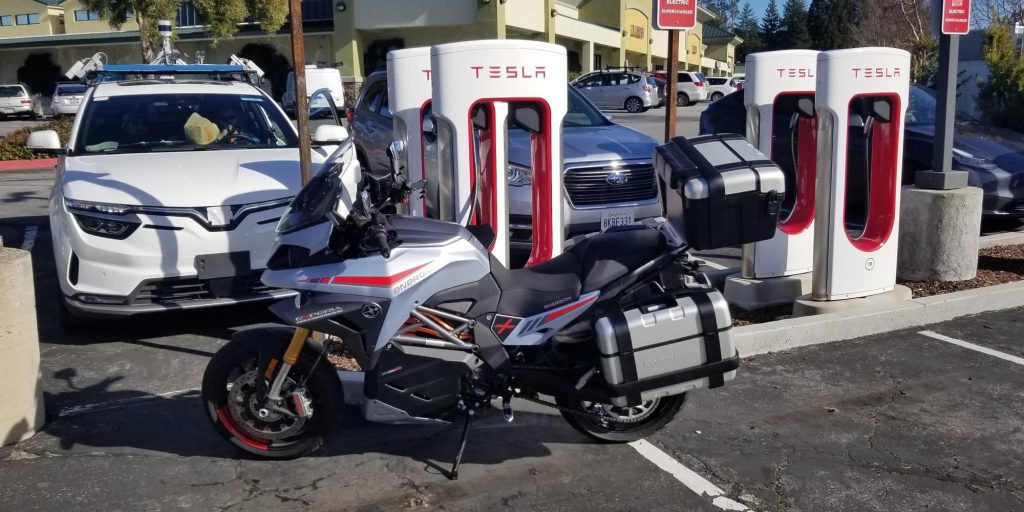
But don’t electric motorcycles suck to charge?
If you’re new to electric motorcycles or even electric vehicles in general, then you’re probably thinking that charging is a major downside.
In some rare cases, you’d be correct. For example, if you want to do motorcycle touring (riding many hundreds or even 1,000+ miles per day), then it can be burdensome on the majority of today’s electric motorcycles. It’s been done on e-motorcycles, though it takes a bit of planning.
But outside of the rare case of someone riding through multiple states in a single day, charging is actually an advantage of electric motorcycles, not a disadvantage.
If you use your motorcycle for commuting or daily transportation, a battery is simply better than a fuel tank. Since you can charge at home overnight, you start every day with a “full tank.” It’s as convenient as having a gas station in your garage, except without the smell or long lines. With a battery instead of a fuel tank, you’re never stopping to fuel up since you simply charge at home while you’re sleeping. Most electric motorcycles have ranges of hundreds of miles in the city. That means for commuters, you’re basically never worried about range or where you can find a plug since you start every morning fueled up.
Ironically, you’ll find that when used in a commuter role it is gas-powered motorcycles that end up range anxiety. They can’t fuel up at home so they always need to know where a gas station is.
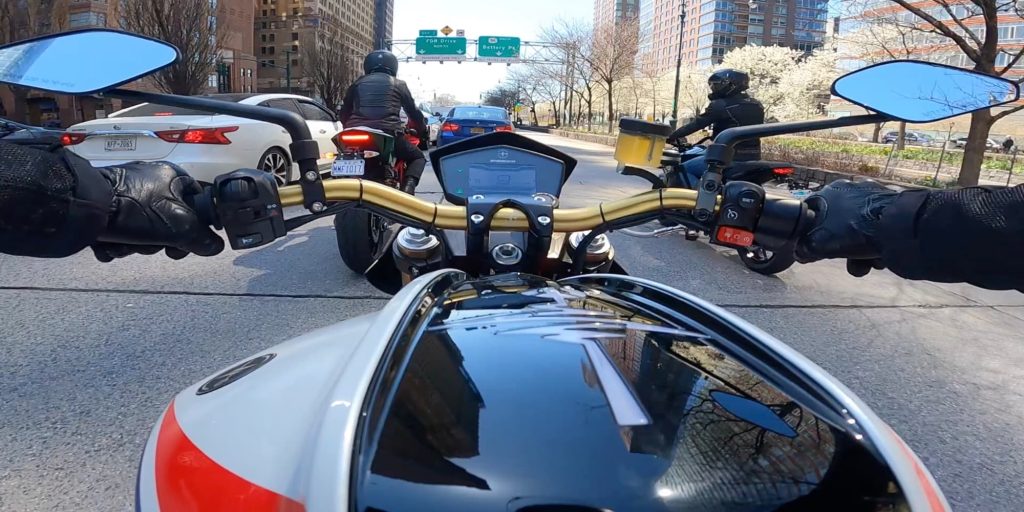
The traditional gas bike riders will try to tell you that because electric motorcycles aren’t as good at touring, they’d make a poor choice to own. But again, they’re wrong.
First of all, most people don’t go on several-hundred-mile touring rides that often. It’s a small minority of all motorcycle rides. For most people, finding several days or weeks to dedicate to such rides simply isn’t feasible very often. And if that’s something you really want to do once or twice a year, you can rent a gas bike to do it. That way for the other 360 days a year you ride a nicer, more convenient electric motorcycles.
As a new rider, the vast majority of your rides will be in the sub-one-hour range. You’re not going to be riding coast to coast very often in the beginning of your motorcycling journey.
Secondly, electric motorcycles actually can do touring thanks to fast charging. Several e-motorcycles now use DC Fast Charging, which refills the battery most of the way in around 35 minutes. It’s longer than a gas fill up, sure. But after a couple hours of riding, you’ll want to take a break to stretch your legs, get a coffee, drain out the last coffee, etc.
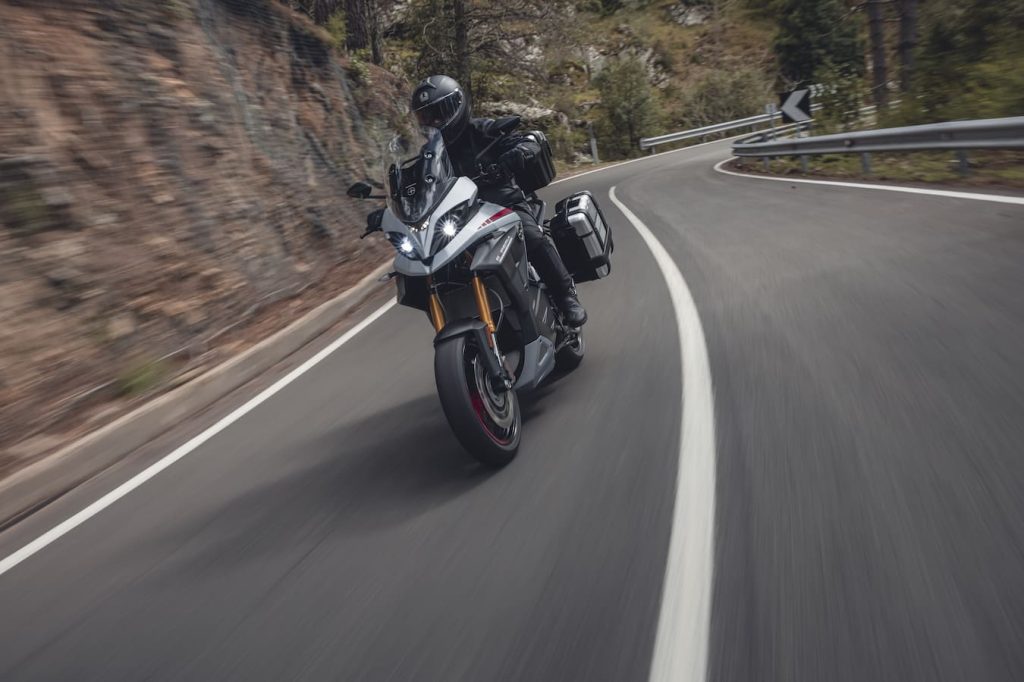
Are electric motorcycles expensive?
Purchase price and charging times are the two major areas that I hear gas bike riders cite as reasons new riders shouldn’t start with an electric motorcycle. We’ve already covered why the charging issue is baloney. Now let’s talk price tags.
Addmitely, electric motorcycles are usually still a bit more expensive than gas bikes with the same speed and power specs. It’s to be expected since a better vehicle is going to cost more. But the price gaps aren’t as big as they used to be, with the larger price gaps still on the higher performance end of the spectrum. And most new riders aren’t going to start with an ultra high performance electric motorcycle.
If you look at something like a $25,000 Energica that can hold its own against a Ducati, then yes, they’re expensive. But if you start with a much more reasonable lightweight or middleweight electric motorcycle, then the prices are more reasonable as well.
The SONDORS Metacycle, which is capable of highway speeds but is better suited for suburban or urban commuting, fluctuates between $4,000 to $6,500 depending on current sales. Newcomers like the Ryvid Anthem are priced at $7,800. And the CSC RX1E, which can reach 80 mph (130 km/h) and has a city range of around 80-100 miles (130-160 km), is priced at around US $8,500.
But if you want to go even smaller and really dip your foot in the shallow end of the electric motorcycle pool, there are mini options like the CSC City Slicker at just $2,900.
Granted, these are all available in the US as that is where the majority of our audience lives. But if you’re outside of the US then you probably have even more options for low-power and mid-power electric motorcycles.
Most of these bikes are imported from Asia anyway, and Europe and Oceania are currently being flooded with new options for cost-effective and modestly powered electric motorcycles. So while this article is a bit America-centric, rest assured that you’ve probably got some good low-cost e-motorcycle options in your neck of the woods.
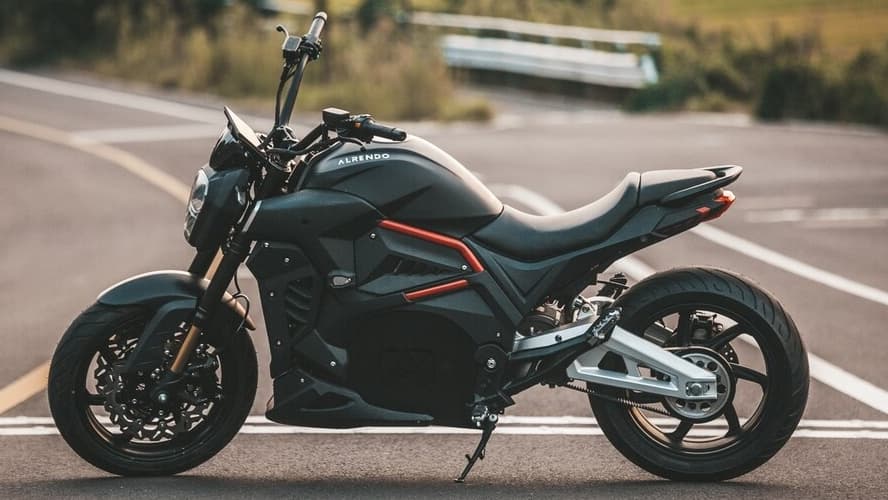
An environmentally conscious decision
You’ll notice I saved this one for last. I think the environmental impact of electric motorcycles is important, since we have only one planet Earth and we all share it. But let’s be honest, most new riders are going to place more importance on the fun, convenience, and cost aspects of electric motorcycles.
Even so, you should know what a big impact on the environment is at stake here. Emissions caused by transportation are one of the leading causes of climate change. While trying to not sound too alarmist here, we are steadily destroying this planet. If you have children, they will live in a worse environment than you do now. That is a simple fact, not up for debate.
There’s a chance that if humanity works together, we can change that. I’m not yet totally convinced that our species has the collective will to achieve that level of cooperation, but it is still physically possible. And putting fewer polluting vehicles on the road is a step in that direction. Even if not for your future kids’ health, then what about yours? If I asked you to wrap your lips around the tailpipe of a combustion engine, would you do it? No, of course not. You know that’s literally cancer-causing fumes being pumped out of it. So why would you ask other people to breath in a carcinogenic cloud from your own tail pipe?
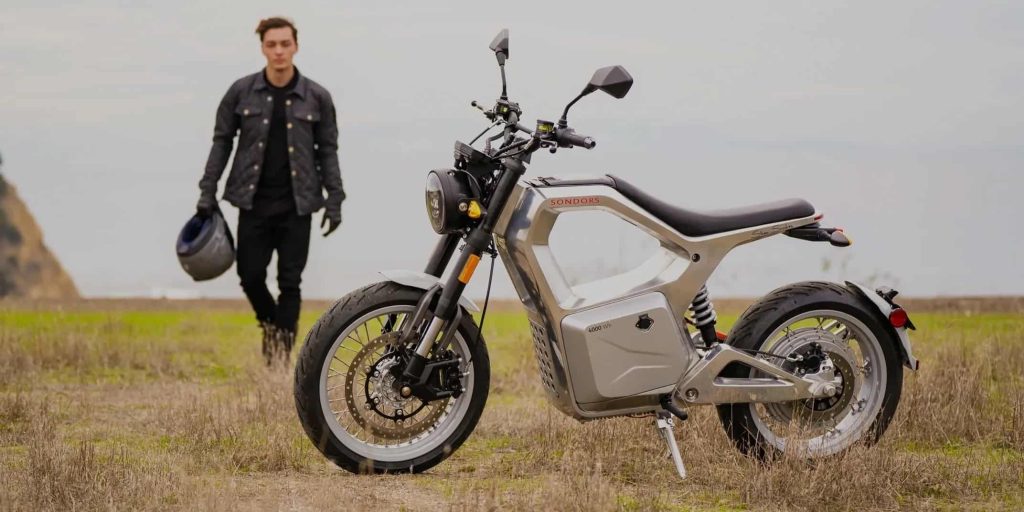
Electric motorcycles make the perfect starter bikes for new riders
So there we go, I’ve beaten this dead horse to the point of corpse desecration. The point is simple: Electric motorcycles make a better choice for new riders for so many reasons. They’re easier to learn on. They’re easier to ride. They’re cheaper and more convenient to own. They’re healthier for you and everyone around you. They’re simply better.
Despite all those benefits though, you unfortunately will probably still need to ride a gas bike, at least for a few days. If you live in the US or many other countries, you’ll still likely have to learn to ride a gas motorcycle to get your license. At least, for now.
I’ve gotten two motorcycle licenses in two countries and each time I was put on a gas bike to do it. Several years ago I got my motorcycle license in an MSF course in the US. It was two evenings of classroom instruction followed by a weekend of parking lot instruction, capped off with a parking lot exam. After years of riding in Tel Aviv without a local motorcycle endorsement (“Sorry officer, I didn’t know…”) I finally went through the process internationally too. There it involved 12 classes of combined parking lot and street-riding instruction, followed by both a parking lot and a street-riding exam.
In both cases I was put on a gas bike to do my instruction and testing. As much as I’ve harped on the advantages of electric motorcycles, I don’t hate that I had to learn and demonstrate proficiency on a gas bike multiple times. It’s allowed me to occasionally borrow gas bikes from friends or family. And if I ever need to do an action movie sequence where I kick someone off a motorcycle and hijack it to chase down a bad guy, chances are it’s still going to be a gas bike for the next few years until electric motorcycles eventually become the majority.
So it’s not a bad skill to have, knowing how to operate a gas bike. It’s kind of like the value of knowing how to operate a manual transmission in a car. I almost never drive anymore since I pretty much live on two wheels. But the rare case comes up, usually on vacation, where my wife and I are the only ones in our friends group that know how to drive a stick. That means when traveling, especially in Europe and Asia, we’re able to beg, borrow, or rent a car more easily (though it has the downside of forcing us to be designated drivers in any group we’re in). It’s not a skill I use often, but I’m glad to have it. And so if you have to learn how to ride a gas bike to get your license and then immediately switch to an electric bike, that’s not a terrible thing.
And look, even if after this long and drawn-out article about the advantages of electric motorcycles you still end up wanting a gas bike, I won’t lose any sleep over it. Whatever you ride, you’re going to have a blast. You may be surprised how open and accepting the motorcycle world is. It’s full of fun people that enjoy riding. At around a quarter of the red lights I roll up to other gas bikers will start asking me about my electric ride. It’s a fun world full of cool people. And if you end up on a gas bike, that’s not the end of the world. You’ll still have a great time.
Just not as great as if you went electric. 🙂
